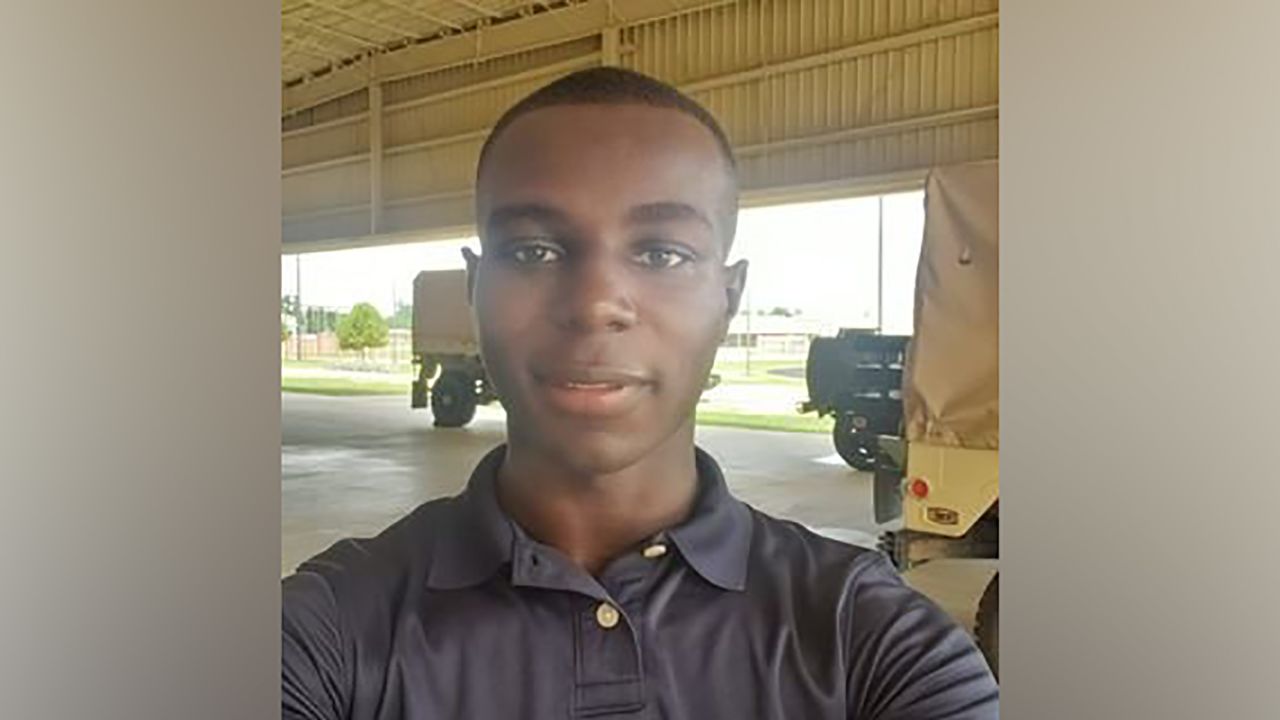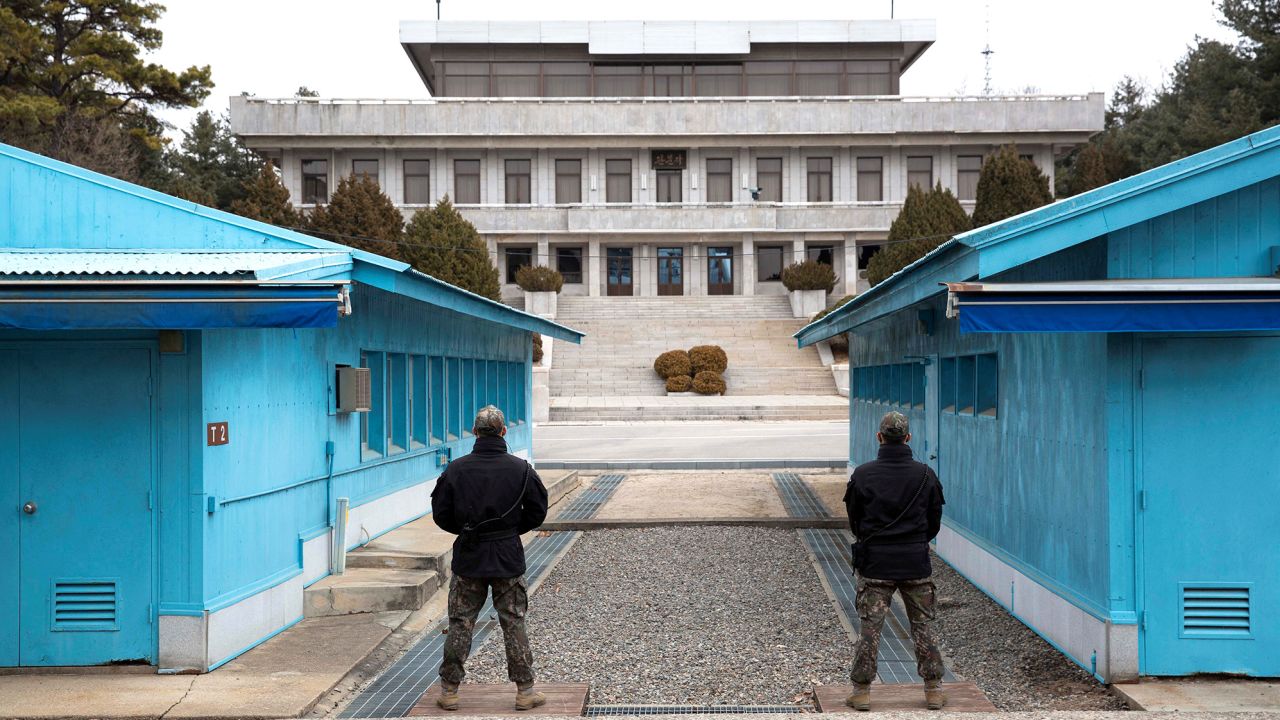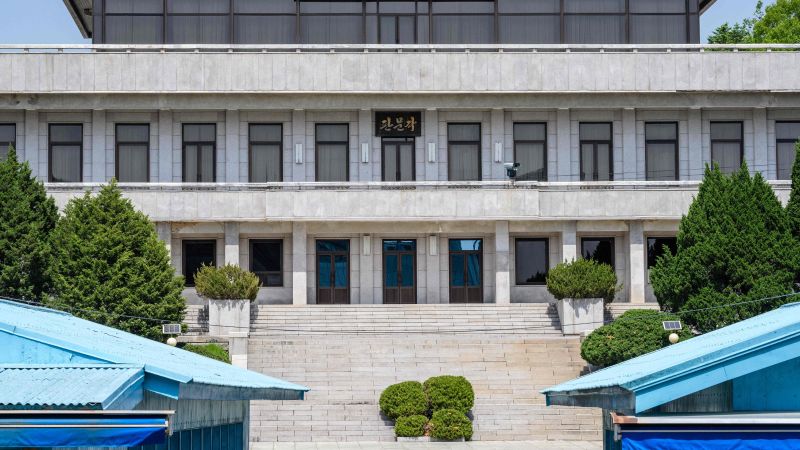US soldier believed to be detained by North Korea after ‘willfully’ crossing border
#soldier #believed #detained #North #Korea #willfully #crossing #border,
[ad_1]
Seoul, South Korea
CNN
—
The US Army has identified a soldier who crossed the demarcation line into North Korea as Pvt. Travis King, a cavalry scout who joined the military in January 2021.
King had been on a tour of a border area as a civilian when he crossed into North Korea on Tuesday, following a yet unclear sequence of events that come at a time of fraught diplomacy and rising military tensions on the Korean Peninsula.
US Forces Korea spokesperson Col. Isaac Taylor said Tuesday that a US soldier “willfully and without authorization” crossed the line during a regular tour of a section of the buffer zone between North and South Korea known as the Joint Security Area (JSA).
“We believe he is currently in (Democratic People’s Republic of Korea) custody and are working with our (Korean People’s Army) counterparts to resolve this incident,” Taylor said in a statement, referring to North Korea’s military.
King’s motive for crossing the border remains unclear. An army official told CNN the private was set to be administratively separated from the US Army after facing disciplinary action for assault.
King’s mother, Claudine Gates, told ABC she was “shocked” after being told by the US Army that her son had crossed into North Korea.
“I can’t see Travis doing anything like that,” Gates told ABC, adding that she heard from her son several days ago and he told her that he’d be returning to his base in Fort Bliss.

King had spent 50 days in a detention facility in South Korea, according to two US officials, though it is unclear when or where he was held.
One of the officials told CNN the private was escorted to the airport to return to the United States, but the escorts were unable to accompany him to the gate and he did not board his flight.
It remains unclear how he was then able to join the tour of the JSA, which lies along the 160-mile-long and 2.5-mile-wide demilitarized zone (DMZ) that has separated North and South Korea for decades.
The JSA is the most recognizable part of the DMZ, and tours of the area are open to the public and organized by the United Nations Command, which secures the area.
Unlike most of the heavily fortified zone, the actual border line between North and South Korea at the JSA does not have a physical barrier.

At the time of his rotation in South Korea, King was assigned to the 6th Squadron, 1st Cavalry Regiment, 1st Brigade Combat Team, 1st Armored Division out of Fort Bliss, Texas, according to Army spokesperson Bryce Dubee.
King is administratively attached to 1st Battalion, 12th Infantry Regiment, 2nd Brigade Combat Team, 4th Infantry Division, Dubee said.
King has no deployments on his record. His military awards include routine decorations provided to soldiers with his rank and experience – the National Defense Service Medal, the Korean Defense Service Medal, and the Overseas Service Ribbon.
US officials told CNN King had been held in a designated detention facility under the Status of Forces Agreement with South Korea, which defines how US service members, their family, and other Defense Department personnel are processed in a foreign country, including its justice system.
According to a summary of the agreement from US Forces Korea, pre-trial confinement can be at a US facility, but post-trial confinement is in a South Korean prison. It is unclear where King was detained.
On Wednesday, South Korean police told CNN King was transferred to US military police by South Korean authorities following an incident last September.
Police said King was involved in an assault incident involving a South Korean national or nationals. He was transferred after an investigation and without detention since the alleged assault was not severe enough for an arrest, police told CNN. It’s unclear if this was the same incident King faced disciplinary action over.
Before King was identified, Defense Secretary Lloyd Austin confirmed that a US soldier had willfully crossed into North Korea, saying he was “absolutely foremost concerned” about the soldier’s welfare.
“We’re closely monitoring and investigating the situation, and working to notify the soldier’s next of kin, and engaging to address this incident,” Austin said at a press conference on Tuesday.
State Department spokesperson Matt Miller also on Tuesday said the department had not reached out to the North Koreans or any other governments, including China, and that the Defense Department was “in the lead” on the issue.
“We will stay in close coordination with them over the next hours, and if there are steps that would be useful for the State Department to take, we of course will not hesitate to take those,” Miller said.
The DMZ was created at the end of the Korean War in 1953 and has become one of the most heavily fortified borders in the world, ringed by miles of barbed wire and landmines and patrolled by soldiers from both sides for decades.
Under a deal between the belligerents – North Korea and China on one side, the collection of Western allies on the other known as the United Nations Command – the Korean Peninsula was roughly cut in half and a buffer zone created between the two.
That deal was signed at the village of Panmunjom, which became the JSA – the one area along the DMZ where the two sides could meet for negotiations and prisoner swaps.
The JSA has been disarmed since 2018 after an inter-Korean military agreement, so both the UN Command and North Korean soldiers at the area are unarmed.
Neither the UN Command soldiers or the North Korean soldiers are allowed to cross the military demarcation line separating North and South. US soldiers continue to be stationed on the South Korean side of the JSA because they were part of the original UN Command.
A series of checkpoints must be passed to get to the JSA, but the border is only marked by a small raised line on the ground. Stepping across it requires just one step, as then-US President Donald Trump did when he met North Korean leader Kim Jong Un in the JSA in 2019.
During a JSA tour, participants are kept about 20 yards or so from the line Trump stepped across. Though there are guards on the South Korean side of the border during the tours, no guards were seen on the North Korean side when CNN took a press tour of the JSA last year.

Under leader Kim Jong Un, North Korea has been ramping up tests of potentially nuclear capable intercontinental ballistic missiles – raising concerns among the US and its Asian allies.
Early Wednesday, North Korea tested two short-range ballistic missiles that landed in the sea between the Korean Peninsula and Japan, South Korea’s Joint Chiefs of Staff said in a statement.
It followed another test last week, in which North Korea test-fired what it said was a solid-fueled Hwasong-18 intercontinential ballistic missile, which had a 74-minute flight time.
The same day the US soldier crossed the border, a moment of intense historic and strategic symbolism was taking place at the South Korean port of Busan – for the first time since the early 1980s a nuclear capable US submarine was making a port call.
That visit came as Kurt Campbell, coordinator for the Indo-Pacific at the US National Security Council, was at the inaugural meeting in Seoul of the Nuclear Consultative Group (NCG).
The NCG is a joint US and South Korean panel set up by the countries’ leaders at a summit in Washington in April.
During that summit US President Joe Biden and South Korean counterpart Yoon Suk Yeol unveiled a “Washington Declaration” that included a set of measures aimed at making Pyongyang think twice about launching an attack on its southern neighbor.
This story has been updated with additional reporting.
[ad_2]
thank youf or watch : US soldier believed to be detained by North Korea after ‘willfully’ crossing border
[ad_1]
US soldier believed to be detained by North Korea after ‘willfully’ crossing border
[ad_2]
